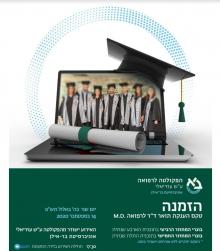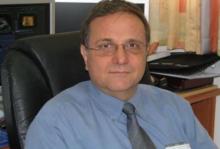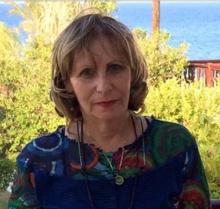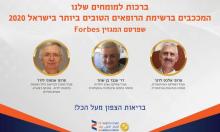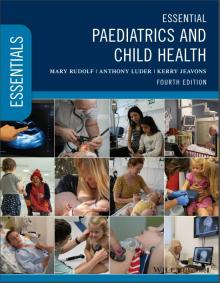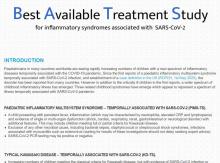Faculty News
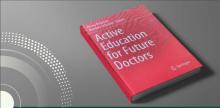
Book Launch Event: Active Education for Future Doctors (Nomy Dickman, Barbara Schuster eds.)
תאריךThe Bar-Ilan University Central Library launched Azrieli Faculty member, Dr. Nomy Dickman's new book, Active Education for Future Doctors, in a well- attended evening Zoom meeting on October 13, 2020. This was the second in a series of University book launches.
The two hour event was hosted by Dr. Olga Goldin, director of the University Library System, and coordinated by Ms. Naomi Avrahami.
Prof. Amnon Albeck, rector of the University, opened by quoting from the weekly Torah portion (Bereshit) that discusses "tohu vavohu," colloquial for lack of order or sense. He stated that in these times of Corona-generated tohu vavohu, education is the only stable constant; not one day of studies was missed. He ended on an optimistic note, pointing out that this Corona era gives us the opportunity to improve on education (with the help of Dickman and Schuster's book of course).
Prof. Karl Skorecki, dean of the Azrieli Faculty of Medicine, also quoted from Bereshit, mentioning the Tree of Knowledge – “etz hadaat tov v’rah.” Knowledge includes not only truth, but values (tov v’rah – good and bad). The Azrieli Faculty views this as an integral part of medical education. He also pointed out that although we are in a new era, even Abraham Flexner in 1910 appreciated the importance of active education in medical training.
Prof. Eric Shinwell, associate dean of medical education, thanked Dr. Dickman for her timely resource. He admits that resistance to change is natural, but that even a dry lecture can be turned into an active experience. He made sure to mention the introduction and success of the flipped classroom to the Azrieli curriculum.
Before Dr. Dickman and Prof. Schuster offered a few words, guest lecturers Prof. Nitza Davidovitch of the National Forum for the Advancement of Education and Teaching in Academia, Dr. Michael Kaffman of the Israeli Medical Association and Prof. Roza Leikin of the University of Haifa shared their insights and presented questions for future consideration.
Active Education for Future Doctors can be accessed here or purchased here.
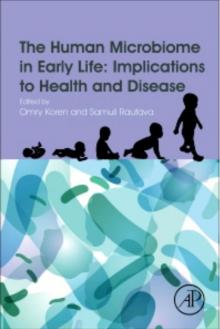
"The Human Microbiome in Early Life: Implications to Health and Disease" published (Prof. Omry Koren)
תאריךThe Human Microbiome in Early Life: Implications to Health and Disease presents recent research advances that have highlighted the significance of early life, possibly beginning before birth, in the establishment of both the microbiome and its role in health and disease. The book reviews current knowledge on the origins of the human microbiota in early life, presents exposures which may disturb normal microbial colonization, and covers their implications to the risk of disease. Finally, emerging means to modify the early human microbiome to improve health are discussed.
MD Graduation Ceremony Takes Place Via Zoom, Sept. 14, 2020
תאריךCongratulations to the 109 graduates who can now call themselves medical doctors. The ceremony, for the fourth graduating class of the four-year track and the fifth graduating class of the five-year track, was held via Zoom due to Corona restrictions. Some 200 viewers watched and listened to Prof. Karl Skorecki, Dean; Mr. Noam David Reshelbach, administrative head; Prof. Miri Faust, Rector; Mr. Shuki Ohana, Mayor of Safed; Ms. Nurit Naaman, a nurse and mother of one of the graduates; Ms. Sharon Mines, academic coordinator; and Dr. Itamar Zadok, a student, share their blessings. All took the oath together and were acknowledged by name.
Associate Prof. Elon Glassberg Appointed Chief Medical Officer (Surgeon General) of IDF Medical Corps
תאריךCongratulations on the appointment of Associate Professor Elon Glassberg to the position of Chief Medical Officer (Surgeon General) of the IDF Medical Corps. Professor Glassberg is highly published and teaches surgery at the Faculty.

Azrieli Faculty of Medicine Search and Rescue Drill with IDF Home Front Command
תאריךSearch. Rescue. Build!
There was a lot of excitement and activity at the Azrieli Faculty of Medicine on Monday September 7, 2020. Having received the green light to purchase the land rights where an old Bezeq (Israeli telephone company) building was situated, a block from the current Azrieli campus, a creative idea surfaced, brainchild of the administrative head, Mr. Noam David Reshelbach: Optimize the opportunity for a search and rescue (SAR) drill, following the destruction of the current building, and before the erection of the new BIU edifice.
A week earlier, the Bezeq building was carefully demolished by contractors hired by BIU, while under the supervision of Mr. Gadi Buganim, head of the BIU Operations Division Construction Department. But before the 1200 square meter building sitting on a 2000 square meter lot was wrecked, human “dummies” with pre-defined injuries and medical histories were carefully placed throughout the site, in anticipation of the drill to take place. Come September 7, the Israeli National Search and Rescue Unit of the IDF Home Front Command, accompanied by BIU and Municipality of Safed representatives, Magen David Adom, the Israeli Police, the IDF Canine Unit, ZAKA, and some 100 reservists (who were deliberately only alerted of the drill that morning!), commenced with a search and rescue exercise that would continue for the next three days. Drills of this nature are essential for the unit, so the opportunity was warmly welcomed. The Faculty extended its hospitality by opening its doors to the IDF, allowing it to use the existing campus as its base.
A lot was learned at the drill, which was designed to simulate a rocket attack or earthquake with massive ensuing destruction on an old age home. The reservists (from all professions and walks of life) were granted a perfect opportunity to practice “real time” a new branch of emergency medicine, called Disaster Medicine, which focuses on the unique issues involved in search and rescue. All ages can be affected, and injuries on all major organs can ensue. Imagine these scenarios: how does one administer an IV in the dark, under dusty conditions, to a trapped victim? How does one quickly and safely amputate a destroyed limb under these conditions, if there is no other way to save someone trapped in a building about to collapse? What happens to the human body when a heavy object is lifted after days of being trapped (potassium and myoglobin can build up in the cells and suddenly cause fatal arrhythmia or kidney failure once blood flow is resumed, even on the way to safety, termed Crush Syndrome).
Prof. Dan Nemet, a professor of pediatrics at the Sackler School of Medicine and a specialist in pediatrics and sports medicine, who was Physician in Chief of the Israeli National Search and Rescue unit, and in charge of medical training for the drill added: “What is unique about this type of drill is that three factors must be considered at the same time: the medical situation, the physical structure or the engineering aspect, and the danger to the rescued and the team. It is called Urban Search and Rescue Medicine. Unfortunately, Israel has a lot of experience in this field, from the Tyre headquarters bombings in Tyre, Lebanon in the 1980s and then worldwide when we were called to action due to our expertise. Our unit is a member of the United Nations’ International Search and Rescue Advisory Group (UNSARAG). We also make use of search dogs, and need to know basic veterinary medicine – a specialty called K9 Medicine. We are very grateful to the Azrieli Faculty for thinking of this wonderful educational training opportunity and for offering us the opportunity to experience it and for setting up the realistic scene. This is very unfortunately so needed in today’s reality.”
It would appear that this is only the beginning of an exciting and budding relationship between the IDF Home Front Command and the Azrieli Faculty of Medicine. One of the suggestions following the successful drill was to together design and develop an international course in Disaster Medicine.
The new building, once built, will house the Azrieli Faculty’s Education Facility.
Pictured left to right: Shuki (Yehoshua) Ohana, Mayor of Safed; Lt. Gen. Liron, training officer of national rescue unit; Professor Karl Skorecki, Dean of the Azrieli Faculty of Medicine; Mr. Zohar Yinon, BIU CEO; Lt. Gen. Uri, Commander of Rescue Platoon.
For more pictures, go here (credit to Or Kachlon).
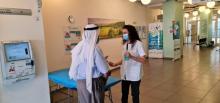
Azrieli Faculty of Medicine Students Assist the City of Nazareth in Coping with COVID-19
תאריךSee BIU spokesman office write-up about Dr. Sivan Spitzer-Shohat's excellent initiative, made possible thanks to the support of The Russell Berrie Foundation.
Prof. Jacob Bornstein Appointed Chief Editor of Pelviperineology Journal
תאריךCongratulations to Prof. Jacob Bornstein, OB/GyN Department Head at the Galilee Medical Center in Naharia (GMC) on his appointment to Chief Editor of the journal Pelviperineology. This important journal, published in Italy since 1982, is associated with, among others, the International Society of PelviPerineology, Israeli Society of Urogynecology and Pelvic Floor, Associaciòn Latino Americana de Pìso Pelvico.
Dr. Nomy Dickman Appointed to BIU Digital Learning Task Force
תאריךCovid-19 has caused most of us to make changes, and quickly. In the field of education - higher education included - the challenge is most pressing. Aware of this urgency to quickly yet effectively adapt the learning environment to the new online reality, Bar-Ilan University has formed a special task force dedicated to digital teaching and learning. This task force comprises approximately a dozen representatives from various BIU departments, and due to her many years of expertise, Dr. Nomy Dickman (Head of Unit, Evaluation and Advancement of Education) has been chosen to represent the Faculty of Medicine. The task force will be preparing a multi-year workplan for the advancement and development of digital learning which will be presented to the Council for Higher Education.
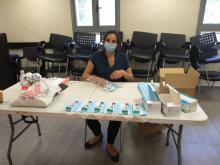
Public Outreach, Azrieli Faculty of Medicine Style
תאריךIn the fight against COVID-19 no one can let their guard down. As part of the unique COVID-19 bio-social-health platform developed by the Azrieli Faculty of Medicine and generously supported by The Russell Berrie Foundation, the Azrieli Faculty partnered with the Galilee Society to create an education initiative in which medical students educate and reach out to the Arabic-speaking population in the Galilee.
The urgency of this project resulted from an observation that infection rates were going up, most especially in the elderly population, those with chronic illnesses, and special needs. In this public outreach campaign, first and second year medical students will be carrying out hundreds of home visits in over 10 Arab municipalities in the Galilee,coordinated with the local welfare departments.
Students underwent brief training by Dr. Muhamed Khatib of the Galilee Society on the challenges of the Arab communities in the Galilee during COVID-19.
Pictured are students preparing PR packages – over 5000 kits including written material on COVID-19 in the Arabic language, thermometers, and masks that they will distribute during the house calls. Some twenty students prepared the packages in August 2020.
For more information, contact the program directors.
%20(1).jpeg)
.jpeg)
Affiliates Chosen as Forbes Best Doctors for 2020
תאריךCongratulation to Prof. Anthony Luder, Prof. Alex Lerner, and Dr. Inbar Ben Shachar of the Ziv Medical Center, an affiliate of the Azrieli Faculty of Medicine, on being chosen among the "Forbes" annual best doctors in Israel listing for 2020.
"Essentials of Paediatrics and Child health 4th edition" (Luder, Rudolf) Published
תאריךWe are excited to announce that a textbook authored by faculty members Prof. Anthony Luder and Prof. Mary Rudolf, has been published by Wiley Blackwell of Oxford, England. An earlier edition of "Essentials of Paediatrics and Child Health 4th edition" was awarded a prize by the BMJ and is a well-known text for students and young doctors.
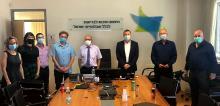
Covid-19 Research Presented at Ministry of Health
תאריךDr. Milana Frenkel-Morgenstern (pictured second from left), an Azrieli Faculty principle investigator, was invited to the Ministry of Health along with other Kupat Holim Leumit partners. Frenkel-Morgenstern presented her very recent research on the connection between low vitamin D levels and serious Covid-19 symptoms.
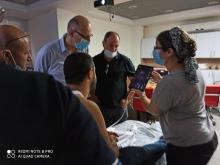
Azrieli Students Train Physicians in POCUS
תאריךThe Bar-Ilan University Azrieli Faculty of Medicine in Safed continues to initiate and create new partnerships with the local health care system, this time directly with local physicians.
After introducing BIU students to POCUS-Point of Care Ultrasound in the community (here) as part of the Faculty’s Covid-19 project (here) and training them in its clinical use, all made possible thanks to the generosity of The Russell Berrie Foundation, the Faculty has recently conducted training for local primary care physicians.
By way of reminder, in June the Faculty conducted training for 8 medical school students working in primary care clinics in the Nazareth area, on the use of POCUS in family medicine. The workshop was conducted in the Clalit Health Services Nazareth Towers. The students were enamored by this technology, which complements the conventional physical exam skills they are taught in medical school. They continued their training in local emergency rooms with emergency care doctors of Safed, Nazareth, and Tiberias, learning, by examining the critically ill, the skills necessary to work with family physicians in the community.
On July 7, 2020 a workshop was held at the Holy Family Hospital in Nazareth in which the students, along with their emergency physician mentors, gave a hands-on POCUS workshop for family physicians. Dr. Bat Sheva Tzadok led the session, and Dr Mahmoud Atamleh trained.
There was electricity in the air as family physicians learned from the students to diagnose acute heart failure, pneumonia, lung trauma, and more. Hadas, one of the students, was amazed at how naturally the family physicians took to the new instrument and technique, with an open mind and much motivation. Hadas and a local doctor eagerly planned how they would incorporate POCUS in evening rounds conducted at the local old age home.
It was an incredible meeting, a merging of emergency doctors, family physicians, and medical students bridging the worlds of community medicine, frontline emergency physicians, and the Azrieli medical school - all with the common goal of advancing primary care in the Galilee
Fighting Covid-19: Best Available Treatment Study (Prof. Anthony Luder)
תאריךProf. Anthony Luder, Azrieli Faculty Special Projects Advisor and Ziv Medical Center in Safed Director of Pediatrics, writes:
Paeditaric Inflammatory Multisystem Syndrome temporally associated with SARS-Cov-2 (PIMS-TC, known in the US as MIS-C) and coined "Cowasaki syndrome" by myself (because of its similarity with Kawasaki), was first diagnosed in Israel in Ziv at the end of April 2020 and since then has become a global, novel Corona associated systemic inflammatory syndrome seen almost exclusively in children, adolescents and young adults. I know of eight cases in Israel (including ours) of whom one has died. I have become the Israeli coordinator for an international research effort focused around Cowasaki and led by Professor Mike Levin at Imperial College London, called "BATS" (Best Available Treatment Study). In addition, the Israel Paediatric association has appointed me to head up a special committee to write Israeli guidelines for this syndrome. For more information about "BATS," and/or to participate in the study, click here.
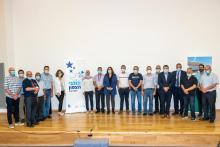
Northern Stars - Mifal Hapais: Strengthening Health Care in the North
תאריךInauguration of multi-year “Northern Stars” program, thanks to 4 million NIS support of Mifal Hapais.
The new “Northern Stars” program will bring the best and the brightest, meticulously selected, medical residents to the Galilee, to specialize in internal medicine and surgery. Six residents will be trained to assume leadership positions in hospitals in the North, in an attempt to effect positive change.
The program is the brainchild of Prof. Ofer Amir, Associate Dean, Specialization and Continuing Education and has been made possible thanks to the generosity of Mifal Hapais that supports projects in the periphery, with the collaboration of the Galilee Development Authority.
The program aims to address a dual challenge: the Israeli medical crisis in general, and the difficulty recruiting outstanding specialists who will integrate into the medical system in the North in particular. Six candidates who have received attractive offers elsewhere will be recruited each year, such that in a few years the North will see a qualitative and quantitative increase in young, excellent local doctors. In time the program will be expanded to include other specializations.
Avigdor Yitzhaki, chairman of Mifal Hapais: “Mifal Hapais is proud to continue the national effort to promote the periphery. The aim of this project is to improve the medical system in the North, so that in the end all citizens of Israel, regardless of their residence, will enjoy the highest level of professional service. The need for professional medical services is of paramount importance these days, and we are pleased to welcome this important project. Regarding the Corona crisis, Mifal Hapais will invest 31 million NIS to strengthen the medical system nationwide by converting existing wards to Corona wards, and continues to invest considerable resources in the hospital's readiness to cope with another wave of the pandemic.”
Prof. Ofer Amir: “We are excited about this process, and thank Mifal Hapais for its significant contribution. We believe in the program and wish the new residents much success, with the hope and belief that this is a significant milestone in the change we long for and for which the Azrieli Faculty of Medicine in the Galilee was established.”
Shlomi Attias, general manager Galilee Development Authority: “The Galilee Development Authority has been working for several years to promote medicine in the Galilee. The Authority, together with its partners, cultivates and guides specialist doctors, residents, and outstanding students to encourage their absorption into the Galilee health system.”
A Hebrew radio interview with Prof. Amir can be heard here.



